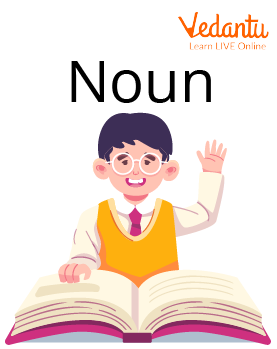Understand Nouns in Class 6 English: Key Concepts & Free Practice PDF for 2025-26
Generally, nouns are considered as one of the first and easy topics of English grammar. However, without a proper understanding of nouns in Class 6, you can be confused about identifying its type in higher classes. So, you must have a thorough understanding of nouns and types of nouns for Class 6.
In nouns for Class 6 English grammar, you’ll learn how to write them and identify their different types (proper, common, collective, material, and abstract). Students effortlessly understand this grammatical concept through various worksheets and exercises that test their skills.
English grammar for Class 6 Nouns Download free PDF
The idea of nouns is discussed in this article. A noun refers to the name of a person, place animal, or thing. The noun refers to both countable and uncountable things, i.e.the things which we could see, touch, and feel and also the things which we cannot see, feel or touch. For example kindness, table, etc. For good understanding and idea clarity, practice questions and solved examples are provided throughout the article. Let's start our journey on this important topic.

The Noun
What are Nouns?
A noun refers to a word that names something, such as a person, place, thing, or idea of something. Nouns can play the role of subject, direct object, indirect object, appositive, or adjective.
Examples:
Person: Man, Ram, Riya, etc
Place: Delhi, Agra, America, Australia, etc
Animal: Cow, Dog, Tiger, etc.
Thing: Chair, laptop, car, etc.

Example of Noun
Types of Noun
Common noun
Proper noun
Collective noun
Material noun
There are other types of nouns as well such as countable noun, uncountable noun, concrete noun, gender: specific noun, concrete noun, etc. for example zoo which we can see and touch comes under concrete noun, example: father-in-law the noun made up of two or more words constitute compound nouns, lady, men, women, etc which symbolizes a specific character male or female constitute gender-specific noun. The types of a noun are discussed in detail hereafter.
Common Noun
A common noun is a name given to any person, place, animal, or thing in general. For example girl, in general, refers to all the community of girls, and names like Radha, and Priya come under it and refer to a single person.
For example cities, states, boys, etc all refer to the whole community.
Proper Noun
The proper noun refers to the name of a particular person, place animal, or thing.
For example Mumbai, Agra, Shruti, Dimple, Sahil, Yamuna river, red fort, etc.
Unlike, the common noun it doesn't refer to the names of the community rather it refers to the names in particular.

The Taj Mahal
Collective Noun
A Collective Noun is the name given to a collection of persons, animals, and things taken together as one. As the name suggests, it refers to the collection of things as a whole. For example, An army is a group of soldiers, A swarm is a collection of bees or flees, A flock is a group of sheep, gang A shoal is a group of fish.

Group of People
Material Noun
The material noun is the name of substances or materials. As the name suggests it refers to the names of materials etc. For example cotton, iron, gold, steel, diamond, plastic Etc.
Difference Between Collective Nouns and Common
Basic | Collective noun | Common noun |
Meaning | A Collective noun denotes a group of person place animals or things. | A common noun refers to a general word for the common person, place, animal, or thing as opposed to a particular individual. |
Singular/plural | Collective nouns are generally treated as singular only. | A common noun can either be singular or plural. |
Example | Family, staff, crowd, flock etc | Student, teacher, road, river, etc. |
Difference Between Countable Nouns and Uncountable Nouns
Basic | Countable noun | Uncountable noun |
Meaning | The Countable noun refers to the noun which can be counted with numbers | The uncountable noun refers to the noun which cannot be counted with numbers. |
Singular/Plural | It can take the form of both singulars as well as plural. | It only takes the form of a singular noun. |
Examples | One student, an apple, two bottles, and 8 dogs. | Luck, kindness, water, vegetarianism, etc. |
Difficult Word Meanings
Word | Meaning |
Vegetarianism | Practise of not eating nonveg. |
Gang | An organized group of criminals |
Batches | A set of jobs that are done together |
Summary
Nouns describe the people, things, concepts, and other things that make up our world. They serve as the foundational blocks of language. Your English trip will be more enjoyable and solid if you learn the different types of nouns. Therefore, get proficient with these words and make a point of learning more about this. Let us hear the various words that come to mind.
Practice Question
1. Identify the type of noun: the special name for a person, place, animal, or thing.
Material noun
Collective noun
Proper noun
Uncountable noun
2. Fill in the blanks: a_________of thieves.
Gang
Fleet
Bouquet
Colony
3. Fill in the blanks: My mom made a _________ of cookies.
Batch
Stack
Cluster
Flock
4. Identify the noun in the sentence.
Ram went shopping with his mother.
Ram
Mother
Shopping
All of these
Answers
The special name for the person place, animal, or thing refers to the proper noun.
A gang of thieves.
My mom made a batch of cookies.
The nouns in the sentence are Ram, Mother, and Shopping, So the correct answer is option D, all of these.
Benefits of Learning Nouns in Class 6 English Grammar
Nouns are modifiers in the middle of, beginning, or ending a sentence. Using them makes the portrayal of the necessary meaning possible in a clear manner.
Nouns take up a fundamental portion of the English language, delivering vital grammatical hints in a sentence.
Since students find it challenging initially, learning about nouns as an independent topic will amplify their command and understanding of English grammar.
Nouns inform us if it addresses a particular thing in general, altering the meaning of a sentence by how the nouns are placed.
Examples of Usage of Nouns for Class 6
These are the following ways noun exercises for Class 6 examples are practised:-
1. Fill in the blanks with correct nouns -
I paint my portraits with a _____.
She cut off a few _____ of her hair.
I’m heading back to _____ tonight.
(Strands, Transylvania, brush)
2. Identify the type of nouns -
Ironically, beauty truly is on the inside in this dystopian world.
There was a pool of blood gathering around his torso.
I witnessed her walk out of the fire, unscathed.
Common and Interesting Facts about Nouns for Class 6
The noun definition for Class 6 is as follows - “a noun is a word used as the name of a person, place, animal or thing.” - Wren and Martin. Basically, they are naming words.
There are two types of nouns - concrete and abstract. Concrete nouns contain the below types -
Proper noun
Common noun
Collective noun
Material noun
A proper noun is a name of any specific person, place or thing that always begins with a capital letter. (Jane, Scotland, Eiffel Tower)
A common noun doesn’t mention any person, place, animal or thing but is common to all the categories. (Artist, university, panther, knife)
A collective noun names a certain group/collection of people, animals or things and is specified as a whole. (Horde of zombies, swarm of bees, a dozen oranges)
A material noun names any matter/substance which may or may not contribute to the creation of other things. (Cotton, platinum, water)
An abstract noun names items that can’t be seen or touched but are experienced, thought or felt, such as any state, idea, action, quality, feeling or emotion. (Jealousy, music, freedom)
The above are the common facts and types of nouns for Class 6.
Important Topics of Class 6 English Chapter 3 Nouns
The following are the topics you will be learning in Chapter 4 nouns for Class 6:
What is a noun and its different types?
How to place a noun in a sentence according to its structure?
Identifying nouns in a sentence.
Create your own sentence that contains nouns of your own choice.
Various other noun exercises for Class 6.
Class 6 English Chapter 3 Free PDF Download
Downloading the free noun exercise for Class 6 PDFs that have many exercises and examples on nouns is possible at Vedantu’s website.
This PDF contains enough material that will easily help you understand what nouns and their types are.
Many noun exercises for Class 6 and Class 6 English grammar book PDF with answers can be found, such as creating your own sentences, identifying the type of nouns, filling in/choosing the correct noun, etc.
Lastly, we hope that students will use Class 6 English grammar book PDF with answers to make their preparation easy and quick. There are a lot of benefits of using these worksheets and PDFs. In addition, experts at Vedantu have created these Class 6 English grammar book PDF with answers after conducting thorough research on the topic. Class 6 students will find it easy to learn about nouns and its type and can score good marks in their exams. These PDFs are really helpful in assisting students to quickly understand various grammatical aspects of this lesson.
























